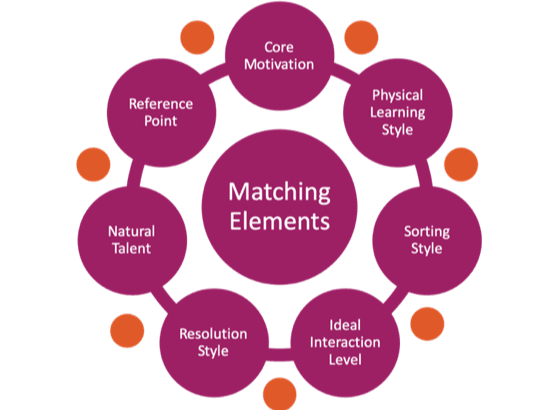
Pollinate’s Knowledge Transfer Index (KTI) is a carefully constructed psychometric assessment that summarizes seven elements of style, preference and ability, all of which affects how people work and learn together.
We use the results of KTI assessments to personalize learning pathways and match individuals for mentoring and coaching at scale, which can involve sorting hundreds of people within an organization into pairs or groups.
The KTI provides insight into the following elements:
Core Motivations
Your core motivations are the underlying drives that provide motivation and shape behaviours and desires. They include your need for influence, relationship, coherence (understanding big picture outcomes) and achievement.
If three of the four core motivation scores are extremely close, we assess a fifth type of core motivation related to the situation or presenting situations.
Natural Talents
Your natural talents can be described as strengths that are your ‘go to’ actions for dealing with any new project, issue, action or information. The KTI gauges your talents in terms of how much you rely on one or a blend of approaches.
Reference Point
Your reference point relates to how you make decisions and see the world, whether you are most likely to rely on your gut, head, heart, hands or a blend of those.
Physical Learning Style
Your physical learning style describes your best strategies for taking in information, whether that is visual, auditory, kinesthetic or a blended style.
Resolution Style
Your resolution style describes your preferred time frame for making decisions or bringing issues to a close. In this part of the KTI, we ask people to imagine a time scale ranging from ASAP (a hard closer who wants things resolved as quicky as possible) through to open as long as possible.
Sorting Style
Your sorting style describes how you sort new information as it is acquired. Research tells us that 80% of the population is skewed to sort for similarities, comparing to other things we may have seen or done. The other 20% of the population sorts for differences, considering, “how is this different than what I have seen or experienced before?” Often those trained in risk management will sort for differences and look for the outliers. Some will have a blended style, switching back and forth between sorting for similarities and sorting for differences.
Ideal Interaction Level
Your ideal interaction level speaks to how much interaction best facilitates learning, a scale that ranges from A LOT to A LITTLE. Ideal interaction level is a narrow slice of our introversion/extroversion inclinations. It’s important to be aware of and respect different learning needs, ranging from those who prefer very limited interaction (they almost always prefer to work independently) to those wanting very plentiful interaction (they need people available to process and learn).
Pollinate’s KTI is often used in tandem with a proprietary algorithm, refined over many years and data points, to create optimal mentor-mentee matches to accomplish specific goals. Today, 96% of mentees who completed a KTI assessment at the beginning of their mentoring program report that they are now better prepared to assume leadership roles within their organization.
Learn more about Pollinate Mentoring Programs or contact us to put Pollinate’s Knowledge Transfer Index to work for your organization.



